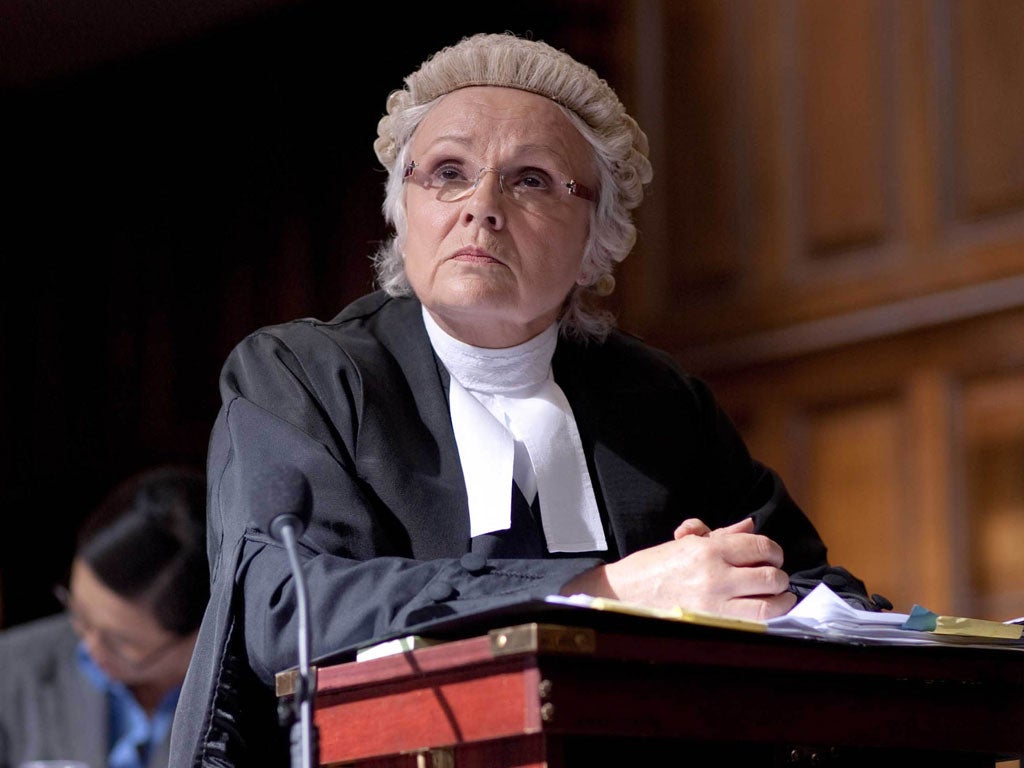The Jury, ITV, Monday to Friday Brunel's Last Launch, Channel 4, Thursday Rev, BBC2, Thursday
Julie Walters defends an alleged triple murderer and weans the nation off Downton ... all at once

Before the second series began, Downton Abbey was blasted by one critic for "glorifying a version of Britain that was hateful in reality".
By last Sunday's final episode, that was the least of our worries, as the plot careered off into a sandpit of shark-jumping lunacy. Still, it was fun.
How considerate, then, of ITV to replace the Abbey habit with a five-part drama spread over each evening at Downton o'clock. Though The Jury was set in the up-to-the-minute present, it had many Downton ingredients: whodunnit suspense, mood-setting music, more characters than a Chinese alphabet, and a tendency to veer towards the bonkers.
Actually, The Jury got there first – this was a revival of a series first shown in 2002. It had the same writer, Peter Morgan, but an entirely new plot and cast, which was given some oomph by Julie Walters, playing the maverick barrister defending a man accused of triple murder.
Somebody once said the best stories centre on a big house, the perfect device around which to weave your characters. A jury is just as neat – 12 people thrown together by a crime, whose lives you can intertwine at will. The structure was taut, too, a textbook five-act play. And there was more character development in five 45-minute episodes than Julian Fellowes managed in 20 hours. We instantly got Paul, because he reads The Independent and quotes Tolstoy. Then there was Kristina, a rich but lonely housewife nursing a glass o' red; Katherine, a teacher with a crush on a sixth-former; Tahir, the Sudanese immigrant longing to leave for America – all human life was here, as multicultural and classless as Downton isn't.
The trouble with normal people is that they don't behave normally. One juror wrote love letters to the defendant; another was impersonating her boss, who was too busy to do jury service. Far-fetched? Maybe, but there was a message here. A message! Apparently, we were being asked to consider whether trial by jury is a flawed system. In the background, James Naughtie kept popping up on the Today programme to discuss its scrapping with a fictional minister.
This was a thoughtful production, with plot twists to keep you guessing – why did weirdo Derek visit a tanning booth every lunch break? (He had pretended to colleagues he was on holiday, not jury service). And then, at the very end, we got a message. Another one! Tahir leaves London for America, but he looks misty-eyed as he passes St Paul's, Westminster, Buckingham Palace. And nine months later, he's back. Britain isn't so bad after all. Even trial by jury, our hopelessly quaint system, works in its own funny way. If Downton was guilty of glorifying Britain's past, The Jury made a convincing case for the present.
There was plenty to make the heart swell in Brunel's Last Launch: A time Team Special, Tony Robinson's investigation of the SS Great Eastern, a Victorian white elephant on an epic scale. This was one of Isambard Kingdom Brunel's least successful projects, a massive iron steamship four times the size of any boat when launched in 1858. The idea was that she could sail her 4,000 passengers to Australia without refuelling. Alas, she was a failure from day one. At her launch, she sank into the mud, and was stuck for two weeks, the timbers of the causeway poking up and piercing her hull. When she finally entered the water, she created a wave so big that 100 people were knocked overboard, and 40 of them drowned. She had some use laying cables before being broken up in 1890. Robinson's delivery was as nasal and annoying as ever, but was worth tolerating to hear this affecting tale of thwarted ambition.
Which brings us to Tom Hollander, who is back with Rev, the cosy sitcom about a put-upon London vicar. Hollander does a good line in bewildered William Boot characters, and Rev is his ideal vehicle. We've been here before, with The Vicar of Dibley and Father Ted, and more than a few gags seem familiar. But it's no worse for that. What's one more glorified version of Britain to add to the list?
Join our commenting forum
Join thought-provoking conversations, follow other Independent readers and see their replies
Comments
Bookmark popover
Removed from bookmarks